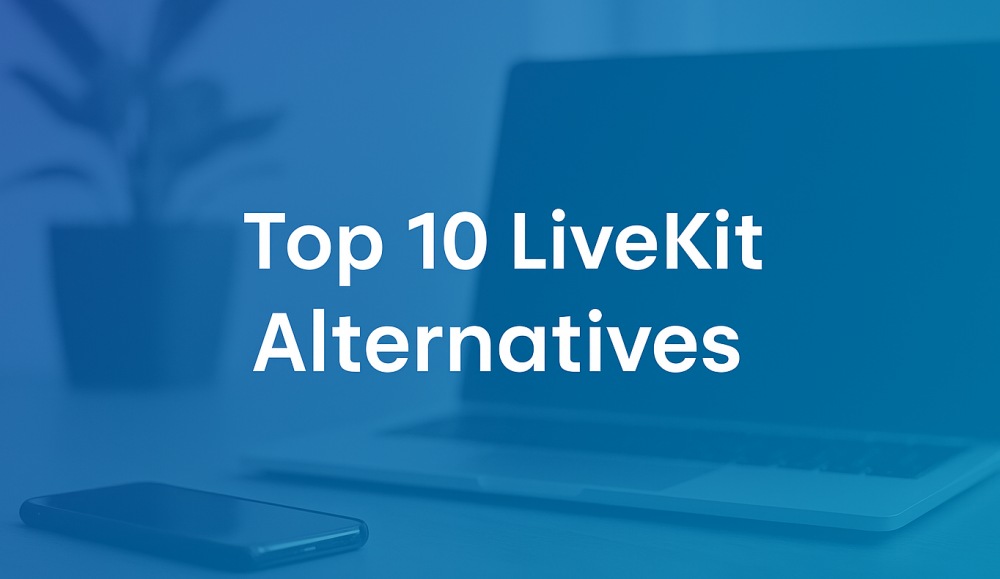As more people join online meetings, apps like LiveKit give them smooth and clear video calls. Besides, many companies and creators search for LiveKit alternatives to get extra features or an easier setup. These tools serve different needs, from team meetings to online classes and events. So, this article will help you explore the top LiveKit alternatives for 2026 with their main features and prices.
What is LiveKit?
LiveKit is basically an open-source platform that lets developers build real-time video or data applications effortlessly. Plus, it offers APIs and SDKs, allowing teams to add features like live streaming and interactive tools to apps. Moreover, LiveKit uses WebRTC technology to keep calls smooth and delay-free, even for large groups. So, developers can self-host it or use LiveKit Cloud for faster deployment and scaling.
In addition, the platform powers advanced voice modes in major AI tools, showing its reliability. Moreover, a large number of businesses choose it for various purposes, like virtual meetings and telehealth. Thus, it is a favorite of developers who require custom solutions since it is flexible and performs well. Still, some teams look for alternatives to LiveKit to match specific budgets, features, or hosting preferences.
Key Features of LiveKit
LiveKit offers a wide range of useful features that make it suitable for many online communication needs. Below, we will discover a few features to help you compare it with LiveKit competitors and decide which option best matches your goals:
- Real-Time Conferencing: LiveKit supports smooth video and audio calls, letting people talk without delays for both small meetings and large events. Plus, you can connect multiple users at once, which makes it a strong choice for global teams on online projects.
- Chat Integration: Users share screens while talking, which ultimately makes online lessons or project discussions simple and effective. Moreover, it includes a native chat feature so participants can exchange messages alongside video or audio conversations.
- Latency Rate: Conversations feel natural thanks to extremely low delays, which benefit live events and online classes. Thus, this speed ensures smooth interaction without awkward pauses, even when many users connect from different locations worldwide.
- Security Controls: Besides, strong encryption keeps every call and shared file private to protect sensitive business or personal communication. So, custom security settings let you control who joins, speaks, or shares, giving full ownership over session safety.
- Deployment Options: In addition, you can run LiveKit on your own servers or use its managed cloud service for faster setup and scaling. Hence, this flexibility allows businesses to choose hosting methods that match their budgets and technical resources.
Use Cases of LiveKit
This platform fits many online communication needs, from small meetings to large-scale events. So, this section covers a few common use cases, which help compare it with LiveKit alternatives:
- Teams Conference: Companies hold live video meetings with clear audio, screen sharing, and chat for smooth collaboration. Here, the system handles thousands of concurrent participants while maintaining high quality for global business operations.
- Livestreaming: Event hosts deliver live broadcasts with just 250ms delay, keeping audience reactions instant. So, this speed helps online auctions, concerts, and product launches feel engaging and fully interactive.
- Telehealth Consultations: Healthcare providers do HIPAA-compliant video visits to protect patient information and meet exacting legal requirements. Plus, doctors share medical scans instantly by improving diagnosis speed and patient care outcomes.
- Customer Support: In addition, call centers use LiveKit to manage video calls, chat, and voice support in one place. Moreover, AI functions eliminate common problems in a matter of seconds and increase satisfaction rates.
- Gaming Communication: Multiplayer games can now fully appreciate low-latency voice and video chat for tactical teamwork. Moreover, players react instantly to in-game events, which ultimately keeps competition intense and fun.
10 LiveKit Alternatives to Consider
Many teams explore LiveKit competitors to find tools that better match their features or hosting preferences. So, the following section provides you with the top 10 LiveKit alternatives to help you choose one that fits your specific communication needs:
1. ZEGOCLOUD
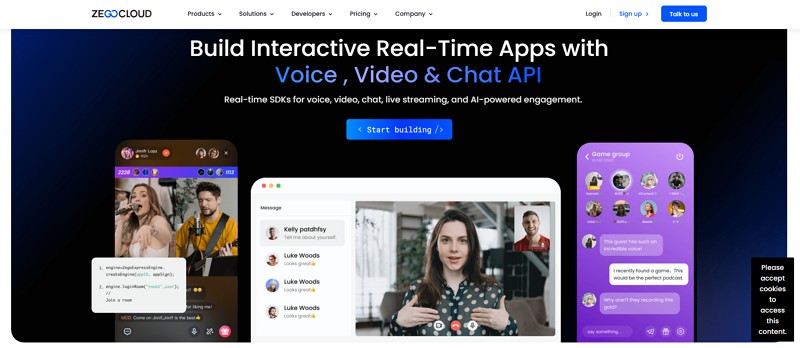
ZEGOCLOUD gives developers easy tools to add real-time video and chat features with minimal coding effort. It also allows complete customization by integrating any SDK or API, letting you design functions exactly how your product requires. Moreover, you can fully adjust UI and UX elements to match your brand identity without facing restrictive API limitations. Low-level API access offers full control for building unique user experiences as your product grows.
Furthermore, the platform delivers 99.99 percent uptime and can scale millions of streams without a decline. It has an average latency of 300ms worldwide, with a low of 79ms globally, making calls easy even with 70% packet loss. Plus, ZEGOCLOUD’s security measures protect user data and meet compliance requirements for privacy in various regions worldwide. With strong scalability and performance, ZEGOCLOUD stands as a capable alternative to LiveKit.
Key Features
- Voice Calls: Developers are able to develop apparent 1-on-1 or group voice calls in the web, mobile, and game space.
- Video Calls: It also allows HD video conferencing with sufficient connections to have personal calls or business conferences.
- Live Streaming: On ZEGOCLOUD, low-latency livestreaming supports the interaction of the audience through comments and polls.
- Audience Interaction: During broadcasts, users have opportunities to even add such functions as Q&A, live reactions, and clickable links.
- Virtual Backgrounds: While video calling, participants can replace or blur video backgrounds to improve privacy and visual appeal.
Pricing Plans
- Voice Call: Starting from $0.99 per 1,000 participant minutes
- Video Call: Starting from $3.99 per 1,000 participant minutes
- Live Streaming: Starting from $0.39 per 1,000 minutes
- In-App Chat: Starting from $99 for 10,000 Monthly Active Users (MAU)
- AI Effects: Starting from $584 per 2 platforms per month
2. Daily
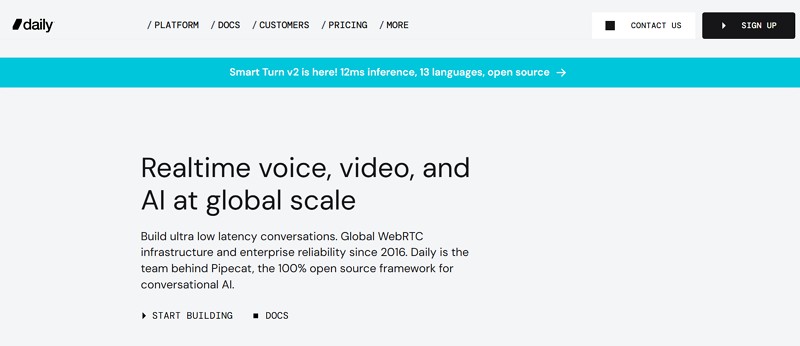
Among LiveKit alternatives, Daily offers ultra-low latency video and voice calls with a median first-hop delay of only 13ms. Plus, it runs on a global WebRTC infrastructure with over 75 points of presence for smooth worldwide connectivity. This platform also delivers 4 times better video resolution compared to many competitors in real network conditions. Moreover, Daily ensures strong security with SOC-2 compliance, HIPAA agreements, and GDPR alignment for data protection.
Key Features
- Delivers 99.99% uptime to ensure uninterrupted communication for teams and customers globally.
- Supports cross-platform development with WebRTC-native SDKs for all applications.
- Moreover, provides advanced audio and video codecs for quality experiences across all devices.
Pricing Plans
- Daily WebRTC Voice and Video: $0.004 per participant minute
- Video Cloud Recording: $0.01349 per recorded minute
- Audio-Only Calls: $0.00099 per participant minute
You may also like: Daily.co vs ZEGOCLOUD: A Deep Comparison
3. Twilio
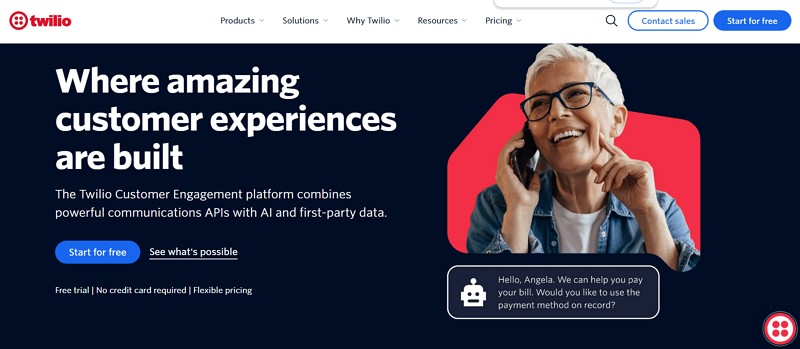
It also comes with enterprise-ready APIs for quickly adding voice, video, and messaging features to applications. Along with that, Twilio includes client-side UI libraries with tools for call recording and network quality checks. Plus, it offers a trusted email API for reliable, large-scale delivery within minutes of setup. Among the available LiveKit competitors, Twilio builds advanced voice experiences with AI to improve customer satisfaction and boost ROI.
Key Features
- In addition, it ensures 99.5% message delivery rates and 91.3% inbox placement for global users.
- It also offers TURN support for improved connectivity in challenging network environments.
- Furthermore, simplifies integration with official SDKs that support quick setup and deployment.
Pricing Plans
- SMS: Starts from $0.0083 for a message
- WhatsApp Business API: Starts at $0.005 for a WhatsApp message
- Voice API: Start at $0.0085 for receiving and $0.014 for making calls
- Video API: Starts at $0.004/min for a video call
- Marketing Campaigns: Start for free with 6,000 emails/month
- Email API: Start for free with 100 emails/day
4. Gumlet
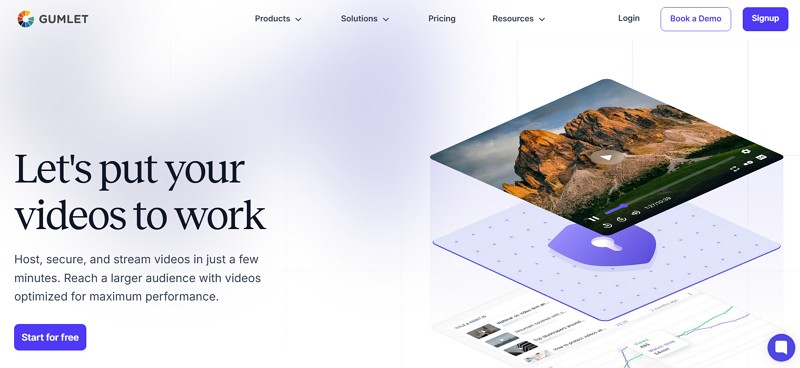
Gumlet stands out among alternatives to Livekit by offering secure and HD video hosting with no-code embedding options. It also optimizes and streams videos through an ad-free player, enhancing viewer experience while maintaining brand consistency across platforms. Moreover, Gumlet supports cinematic streaming from 360p up to 4K HDR10 across devices effortlessly. In addition, it performs GPU-based fast video transcoding with AI-powered, content-aware compression techniques.
Key Features
- Apart from that, it protects video content using Widevine and FairPlay DRM plus 128-bit encryption for security.
- Besides, uses the latest formats like WebP, AVIF, and JPEG XL to reduce image size by half.
- Plus, streams high-quality video using adaptive bitrate over global CDN for fast, buffer-free playback.
Pricing Plans
For Video
- Creator: $19/month
- Professional: $49/month
- Business: $239/month
For Image
- Growth: $39/month
- Business: $259/month
- Enterprise: On Quote
5. Dyte
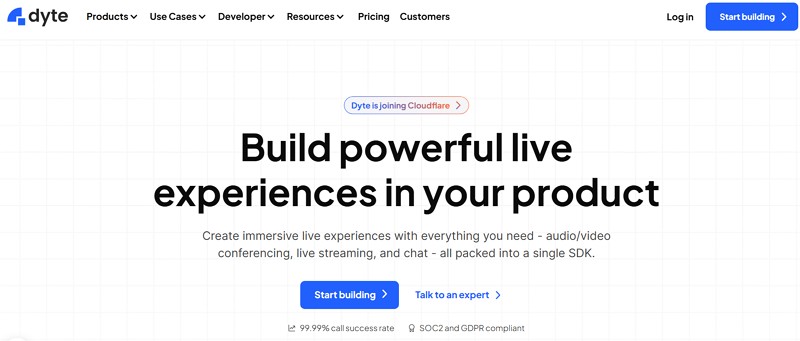
Another LiveKit alternative is Dyte, which offers instant video calls for one or many users. Plus, it delivers jitter-free, HD audio conferencing for seamless conversations anywhere. Furthermore, the platform ensures and maintains a 99.99% call success rate to ensure reliability for critical communications. During video calling, this advanced platform also comes with a 250ms delay for highly responsive and interactive user experiences.
Key Features
- It also complies with SOC2 and GDPR standards to protect user privacy and sensitive data.
- Provides 24/7 technical support to quickly resolve issues and maintain service stability.
- In addition, contains options such as polls and the use of plugins to enhance the involvement of participants.
Pricing Plans
- Video Calls: $0.004 per user per minute
- Audio Calls: $0.001 per user per minute
- RTMP Live Streaming: $0.015 per minute
6. Whereby
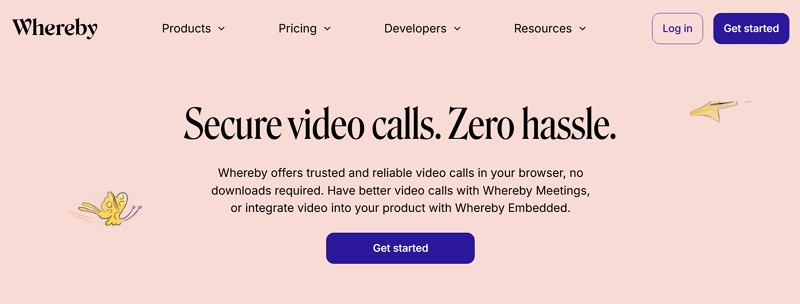
This platform also stands out among livekit competitors with instant browser-based video calls requiring no downloads. Here, developers get API integration, programmatic room creation, and advanced customization. Plus, Whereby ensures GDPR and HIPAA compliance, ISO 27001 certification, and a secure infrastructure. Moreover, users will be able to enjoy many streaming features like screen sharing, file sharing, and transcriptions for better collaboration.
Key Features
- Virtual whiteboard tools promote collaboration through drawings, notes, and visual brainstorming during meetings.
- Developer resources and dedicated success teams provide constant guidance and solutions at no extra cost.
- Furthermore, meeting hosts create permanent room links for quick and repeated access to the same space.
Pricing Plans
Whereby Meetings
- Pro: $8.99 per month
- Business: $11.99 per month per host
Whereby Embedded
- Build: $9.99 per month
- Enterprise: Custom per month
7. YEPIC AI
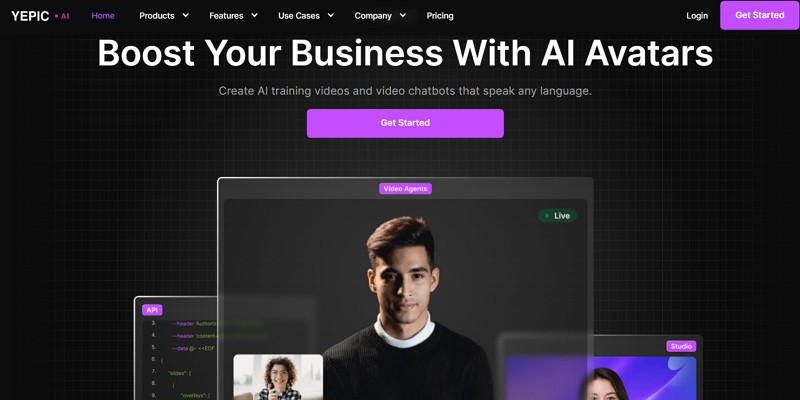
It also comes as an alternative to LiveKit by offering real-time AI video agents with lifelike avatars and multilingual capabilities. Moreover, Yepic AI Studio tools let users quickly create custom AI avatar videos for training and customer engagement purposes. It also provides intelligent AI customer service agents that instantly understand and resolve client queries. Besides, the platform comes with patented multilingual lip sync dubbing technology for customized video content delivery.
Key Features
- It also supports over 120 languages and multiple dialects from top digital voice technology providers.
- Additionally, uses advanced AI models like GPT-4 with document upload support for smarter interactions.
- Produces HD professional AI avatar videos with enhanced customization options for different industries.
Pricing Plans
- Basic: $20 per user, per month
- Creator: $79 per user, per month
- Creator Plus: $199 per user, per month
- AI Employee: $499 per AI Employee, per month
- AI Team Member: $1999 per AI Employee, per month
8. Agora
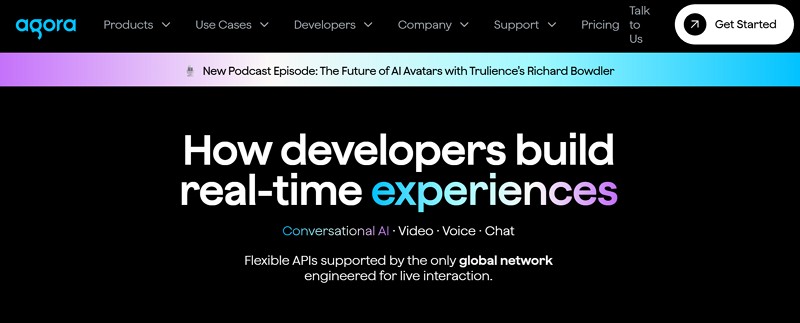
Agora offers flexible modular APIs that let developers easily build unique real-time apps, making it one of the strongest LiveKit alternatives. Moreover, it supports HD video calling with ultra-low latency under 40ms, ensuring uninterrupted real-time communication anywhere. Agora also enables crystal-clear voice calling with AI noise suppression to remove distractions for better audio experiences. Furthermore, it provides live streaming with global reach by letting millions of concurrent viewers engage instantly.
Key Features
- Industry compliance includes SOC2, GDPR, and HIPAA to meet strict enterprise security requirements.
- Moreover, communication tools integrate with IoT devices to enable smart, connected interaction experiences.
- Besides, live speech-to-text instantly generates captions and transcripts for improved accessibility and integration.
Pricing Plans
- Video Calling: Starts at $3.99 per 1000 minutes
- Voice Calling: Starts at $0.99 per 1000 minutes
- Interactive Live Streaming: Starts at $0.99 per 1000 minutes
- Chat: Starts at $349 per month
9. Vonage
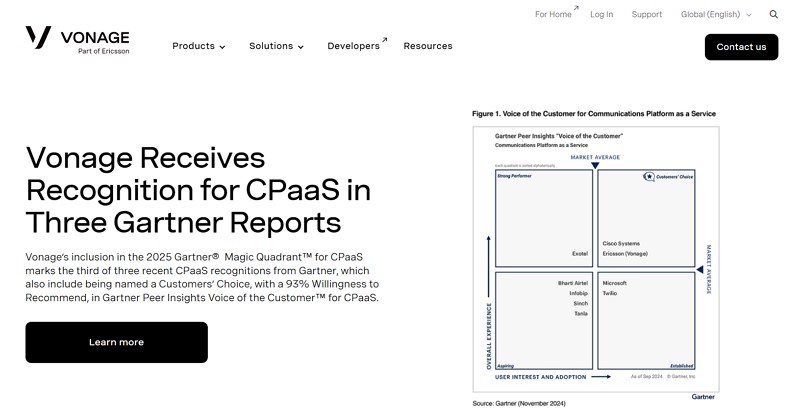
It is also an advanced platform that provides messaging, voice, and video communication APIs to communicate with customers. Additionally, unified communication solutions simplify the task of global teams in order to improve productivity and coordination. Recognized in the Gartner Magic Quadrant for CPaaS, reflecting industry leadership and innovation strength. Moreover, Vonage is a trusted LiveKit competitor with high uptime reliability of more than 100,000 businesses globally, with scalable solutions.
Key Features
- Maintains 99.999% uptime reliability, ensuring uninterrupted business communication across all supported services.
- In addition, handles over 25 billion minutes and messages yearly with consistent service quality.
- It also strengthens customer engagement with real-time interaction tools embedded into business workflows.
Pricing Plans
- SMS API Pricing: Starts from $0.00809 /message
- Messages API Pricing: Starts from $0.00121 /message
- Voice API Pricing: Starts from $0.01446 /minute
- Video API Pricing: Starts from $0.0041 /minute
- In-App Messaging API Pricing: Starts from $0.00080/ message sent
10. 100ms
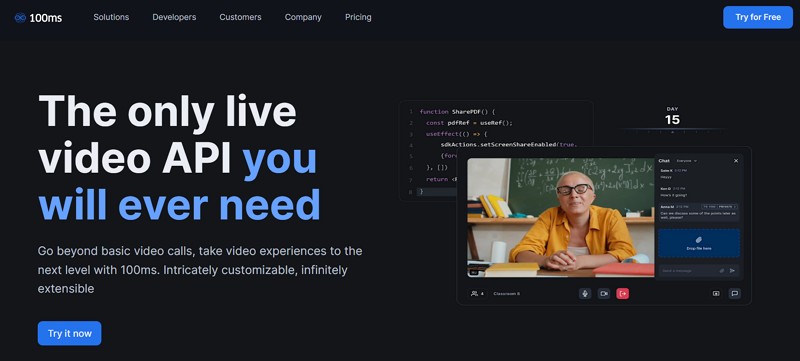
100ms offers fully customizable video APIs for building immersive experiences with minimal coding effort and maximum flexibility. Plus, it supports a smooth transition from private 1-to-1 calls to large-scale interactive live streaming with a single API action. Moreover, this platform delivers latency under 500 milliseconds for calls and 7–8 seconds for massive streams. Furthermore, it lets developers design custom in-room events for dynamic and interactive audience engagement.
Key Features
- Handles up to 10,000 participants in real-time calls without performance or stability issues.
- Supports augmented reality face masks, virtual backgrounds, and noise reduction for better experiences.
- Furthermore, adds custom audio or video tracks for advanced features like playlists or watch parties.
Pricing Plans
- Conferencing: $0.004/min per participant after including 10,000 free minutes
- Streaming: $0.0012/min per viewer after including 10,000 free minutes
- Encoding: $0.04/min after including 10,000 free minutes
- Live Transcription: $0.017/min after including 300 free minutes
You may also like: 100ms vs ZEGOCLOUD: Which One to Choose?
Conclusion
In summary, choosing the right real-time communication platform depends on your needs for video, voice, and interactive tools. Each option offers unique strengths, from scaling large events to customizing smaller group calls.
However, many users are still searching for simpler and more affordable LiveKit alternatives that balance quality and cost. This is why you should explore ZEGOCLOUD for reliable, flexible, and easy-to-use communication solutions.
FAQ
Q1: What are the best LiveKit alternatives?
Some of the top alternatives to LiveKit include ZEGOCLOUD, Agora, Twilio, Daily.co, and 100ms. These platforms provide real-time communication solutions with ultra-low latency, global infrastructure, and rich SDKs for live streaming, voice, and video applications.
Q2: Why should I consider an alternative to LiveKit?
While LiveKit is popular, some teams outgrow its limitations in scalability, latency, or cost-efficiency. Alternatives like ZEGOCLOUD offer all-in-one SDKs, optimized global routing, and additional features such as AI enhancements and advanced QoS monitoring.
Q3: What features should I look for in a LiveKit alternative?
Key features include sub-second latency, global edge coverage, cross-platform SDKs, adaptive streaming, and strong developer support. For AI and interactive use cases, advanced capabilities like real-time captions, speech interruption handling, and AI integrations can be essential.
Let’s Build APP Together
Start building with real-time video, voice & chat SDK for apps today!









